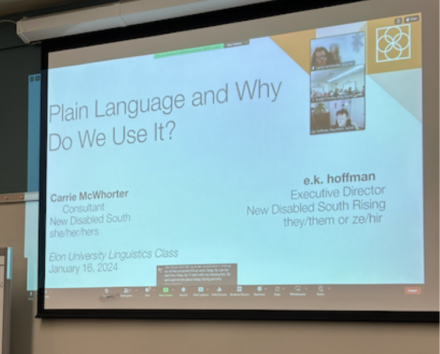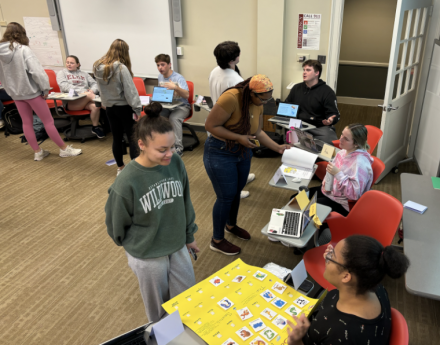Students in ENG 2040 (Language and Society) dove into the connections between language, identity and society with the help of guest presenters, funded by the CATL Winter Term Enhancement Grant.
During Winter term, students in ENG 2040 Language and Society explored issues of language justice, covering topics such as linguistic profiling and discrimination, linguistic diversity, language revitalization, and accessibility.
With the support of the Center for Advancement of Teaching and Learning (CATL) Winter Term Enhancement Grant, guest presenters were invited to share their work on issues of language justice in their communities. Presenters included Vickie Jeffries (Occaneechi Band of the Saponi Nation); Haley Kinsler and Bailey Brown (NCSU Language Diversity Ambassadors); Dominique Canning (University of Michigan, Linguistics); Shaina Jones (Elon University, English); and e.k. hoffman and Carrie McWhorter (New Disabled South).
The course, which meets the new Advancing Equity Requirement (AER), culminated with students developing their own language justice project, producing zines, podcasts, games, presentations, and infographics about issues of linguistic justice.
Indigenous Language Revitalization

Vickie Jeffries, the Tribal Administrator for the Occaneechi Band of the Saponi Nation, talked to the students about the language revitalization project of Yessasahi, the language of the Occaneechi Band of the Saponi Nation. Jeffries, who also works as the community linguist, attends monthly language classes with linguist Corey Roberts from the University of Arizona and encourages her community to use Yessasahi more in everyday life, as a way to preserve their heritage.
“Vickie had a lot of passion and linguistic awareness. She showed us how important language revitalization is, and why people should be aware that languages don’t die out,” said Azul Bellot ’26.
Linguistic Diversity
Other guest presenters encouraged students to value the diversity of human language. Members of N.C. State University’s Language Diversity Ambassadors presented on dialect diversity in North Carolina, from the Ocracoke brogue on the Outer Banks to Mountain Talk in Appalachia. Presenters Haley Kinsler and Bailey Brown, both graduate students in linguistics at N.C. State, debunked common myths about linguistic diversity, reminding students that everyone has an accent.

The course explored how our own language practices are deeply connected to our communities, histories, and personal identities. Dominique Canning, a doctoral candidate in linguistics at the University of Michigan, presented her dissertation research on linguistic practices of Black queer speakers. Her research, which is based on interviews with Black queer individuals in Michigan, addresses metalinguistic awareness among Black queer speakers about practices of code-switching and appropriation, and the importance of language for identity and community.
Shaina Jones, poet and assistant professor English at Elon, encouraged the students to think about what influences their own personal language. Through the representation of a personal language collage, Jones emphasized the importance of acknowledging the many people and communities that have shaped each person’s language.
“Professor SJ spoke with us about the differences in language between our peers based on our hometown and/or country, or words that we use that have become a part of mainstream language, and I thoroughly enjoyed engaging with her during our class period and sharing her work with full authenticity,” said Emerson Garon ’25.
Accessibility through Plain Language

Plain language is language designed to be easily understood by the reader, avoiding jargon and technical language. e.k. hoffman and Carrie McWhorter joined via video call to show the class the New Disabled South Plain Language Policy Dashboard, a resource that provides plain language translations of jargon-filled laws targeting disabled people in the South. hoffman, Executive Director of New Disabled South Rising, and McWhorter, a consultant on the dashboard, discussed the importance of using Plain Language to make laws easily understood by the communities they impact.
Nivea Walker ’26 remarked that “it’s important to give people the support they need because [laws] aren’t written in a way that’s easy to understand, they are written as a hindrance.”
Putting It All Together
On the last day of class, students participated in a gallery walk in which they displayed their Language Justice Project. Students tackled topics from reclamation of slurs, to African American English in the classroom, to gender-inclusive French.

“Hearing from and asking questions from guest speakers directly involved in the social justice topics we were talking about that day really enhanced each subject matter. It also inspired some really unique products for our final projects,” said Sofie Crabbe ’27, who made an illustrated infographic about Maori language revival in New Zealand.


